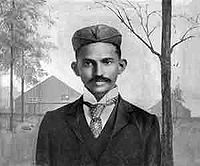- Mohandas Karamchand Gandhi in South Africa
-
 Gandhi in South Africa (1895)
Gandhi in South Africa (1895)
 Gandhi in the uniform of a warrant officer of the Indian Ambulance Corps. He served during the Boer War (1899). Note the crown on his sleeve.
Gandhi in the uniform of a warrant officer of the Indian Ambulance Corps. He served during the Boer War (1899). Note the crown on his sleeve.
Mohandas Karamchand Gandhi was a young man of 24 when he arrived in South Africa in 1893.[1]
Gandhi's work in South Africa dramatically changed him, as he faced the discrimination commonly directed at black South Africans and Indians. One day in court at Durban, the magistrate asked him to remove his turban. In late May or early June 1893, he was thrown off a train at Pietermaritzburg, in the Transvaal, after refusing to move from the first class to a third class coach while holding a valid first class ticket.[2][3] Traveling further on by stagecoach, he suffered other indignities on the journey as well. These incidents have been acknowledged by several biographers as a turning point in his life, his later social activism. It was while witnessing firsthand this racism, that he heard of a bill in the Natal Legislative Assembly curtailing the voting rights of local Indians. When he brought this up with his hosts, they lamented that they did not have the expertise necessary to oppose the bill, and implored Gandhi to stay and help them. He circulated several petitions to both the Natal Legislature and the British Government in opposition to the bill. Though unable to halt the bill's passage, his campaign was successful in drawing attention to the grievances of Indians in South Africa. Supporters convinced him to remain in Durban to continue fighting against the injustices levied against Indians in South Africa. He founded the Natal Indian Congress in 1894, with himself as the Secretary.[1] Through this organization, he molded the Indian community of South Africa into a homogeneous political force, publishing documents detailing Indian grievances and evidence of British discrimination in South Africa. Gandhi returned briefly to India in 1896 to bring his wife and children to live with him in South Africa. When he returned in January 1897, a white mob attacked and tried to lynch him.[4] In an early indication of the personal values that would shape his later campaigns, he refused to press charges against any member of the mob, stating it was one of his principles not to seek redress for a personal wrong in a court of law.
At the onset of the South African War, Gandhi argued that Indians must support the war effort in order to legitimize their claims to full citizenship, organizing a volunteer ambulance corps of 300 free Indians and 800 indentured labourers called the Indian Ambulance Corps, one of the few medical units to serve wounded black South Africans. He himself was a stretcher-bearer at the Battle of Spion Kop, and was decorated. At the conclusion of the war, however, the situation for the Indians did not improve, but continued to deteriorate. In 1908, the Transvaal government promulgated the Asiatic Registration Act, compelling registration of the colony's Indian population. At a mass protest meeting held in Johannesburg on September 11 that year, Gandhi adopted his methodology of satyagraha (devotion to the truth), or non-violent protest, for the first time, calling on his fellow Indians to defy the new law and suffer the punishments for doing so, rather than resist through violent means. This plan was adopted, leading to a seven-year struggle in which thousands of Indians were jailed (including Gandhi himself on many occasions), flogged, or even shot, for striking, refusing to register, burning their registration cards, or engaging in other forms of non-violent resistance. While the government was successful in repressing the Indian protesters, the public outcry stemming from the harsh methods employed by the South African government in the face of peaceful Indian protesters finally forced South African General Jan Christiaan Smuts to negotiate a compromise with Gandhi.He did eventually release him
References
- ^ a b Roxanne Reid, ed (2007). "3". New History of South Africa (First edition ed.). Tafelberg Publishers. pp. 193. ISBN 9780624043591.
- ^ May 31, 1893, was the date of the train incident, according to MK Gandhi's grandson Rajmohan Gandhi (2008), Gandhi: the man, his people, and the empire (University of California Press), ISBN 9780520255708, p. 60.
- ^ June 7, 1893, was the date of the train incident, according to the Pietermaritzburg city website (accessed 6 June 2010), and a commemorative plaque at Pietermaritzburg (see Syed Muthahar Saqaf (2009, Dec 3), "Gandhi’s march goes on in South Africa", The Hindu (accessed 6 June 2010); Anonymous (2004, Sep 17) "Kalam retraces Gandhi's footsteps in SA", Times of India (accessed 7 June 2010); and other online sources for plaque)
- ^ Wikisource: March 1897 Memorial (Gandhi) : correspondence and newspaper accounts of the incident.
External links
Categories:- Mohandas Karamchand Gandhi
- 19th century in Africa
- 20th century in South Africa
- Africa–India relations
Wikimedia Foundation. 2010.
